
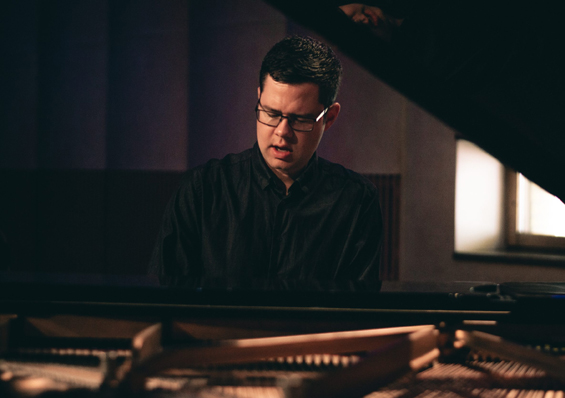
photo: Henrik Buller
FIVE QUESTIONS WITH INGI BJARNI SKÚLASON
One highlight of a July visit to Reykjavik was seeing the Ingi Bjarni Trio perform at the Harpa concert hall. While the set-list emphasized the superb material the Icelandic pianist and his long-time associates bassist Bárður Reinert Poulsen and drummer Magnús Trygvason Eliassen present on their 2024 release Fragile Magic (reviewed here), earlier pieces also found their way into the programme. Deft fusions of jazz and folk, the compositions were all Skúlason originals and as such imparted a cohesive impression. Ingi, a player of finesse and composer of distinction, earned his Bachelor's degree in Jazz Performance at Den Haag, The Netherlands and then his Master's degree in composition from the University of Gothenburg, with exchange semesters in Copenhagen and Oslo. His achievements have been recognized in his homeland multiple times, with an Icelandic Music Prize nomination in 2024 for Farfuglar as jazz album of the year and five nominations for 2019's Tenging among the honours he's received. Shortly after the Harpa show, textura spoke with Ingi about his discography, a fascinating mix of trio, quintet, and solo albums, and other matters, and we thank him for giving his time and energy so generously to the interview.
1. Many a jazz performance tips the balance in favour of improvisation, with the written part used to frame the performance and as a springboard for soloing. In your pieces, on the other hand, the balance is much more even between formal notation and improvisation, with even perhaps slightly more emphasis on the written component. As I listen to a typical Ingi Bjarni Trio performance, the impression forms of music that fluidly flows back and forth between the two poles, so much so that the transitions between composition and soloing tend to blur. Does this in any way accurately describe one of the things you're attempting to achieve in your music?
IBS: I am glad you experience my music this way. I like to think that the best improvisations are those that sound as if they were pre-composed. I also enjoy when there is ambiguity—when you can't tell if something is improvised or not. Sometimes the band and I achieve this in our improvisations, and sometimes we don't. But when it happens, we are completely in tune with the music. We are flowing, and perhaps our subconscious minds are allowed to create undisturbed.
When I was a student doing an exchange semester in Oslo, I was fortunate to have a few lessons with the late Misha Alperin, a Ukrainian pianist and composer. Misha was a very influential teacher for me, perhaps the teacher who inspired me the most. He once told me, “Instead of improvising, write music on the spot.” He also said, “Don't play; you should compose. In this way, it is music. Otherwise, you are just playing exercises.”However, I don't consciously think about approaching improvisation in this way. After all, it's best not to think at all when improvising. But perhaps the words of Misha planted a seed in me.
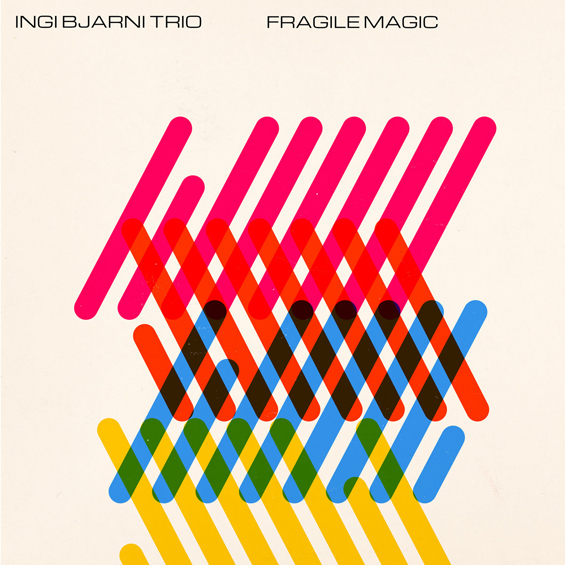
2. While your first trio album, 2015's Skarkali, features you playing with double bassist Valdimar Olgeirsson and drummer Óskar Kjartansson, since then your trio has paired you with bassist Bárður Reinert Poulsen and drummer Magnús Trygvason Eliassen; they not only join you on Fragile Magic but appeared with you on 2018's Fundur. The performance I saw at Harpa a few weeks ago showed that the three of you have developed a powerful connection, such that the music generated registers more as a genuine collective expression as opposed to three separate ones inhabiting a common space. Could you say a few words about what your current bandmates bring to the trio to help give it the identity it has, as well as comment on how the musical connection between the three of you has evolved in the time you've been playing together?
IBS: Trio playing is both liberating and limiting. Usually, in trios like these, the pianist is the leader. I certainly am the leader in the Ingi Bjarni Trio as these are my compositions. However, Bárður and Magnús are very much involved when it comes to shaping the compositions. Also, I am perhaps not the most forward personality; I am somewhat reserved, to be honest. That perhaps translates into the band's sound.
Both Magnús and Bárður are very active and sought-after musicians. What I like about Magnús is that he doesn't overplay and can be very dynamic in his drumming. He has the ability to embrace whatever musical situation he finds himself in. Also, both Magnús and Bárður strive to be in the flow. They listen well and give space for the magic to happen. These are the kinds of musicians I like to work with—sensitive ones.
A lot has happened since we recorded our first album, Fundur, in 2017, both as musicians and in our personal lives. I think it is safe to say that the three of us are more mature, and we have definitely developed individually as instrumentalists.The compositions on Fragile Magic are also more mature than those on Fundur. They are more complex to play, with subtle nuances that the trio needs to tackle together. I also believe that our collective playing and improvising is stronger now than on Fundur. The tunes on it are still a part of the trio's language, though.
It might come as a surprise, but there have been long periods when the trio is not active. However, when we get together and play, we comfortably align into our sound-world, much like friends who don't often meet but can always talk about anything.

photo: IIngi Bjarni Skúlason (l-r: Bárður Reinert Poulsen, Magnús Trygvason Eliassen, IIngi Bjarni Skúlason)
3. As much as you've dedicated yourself to the piano trio format, you're also committed to your other group, the quintet featuring you, Norwegian trumpeter Jakob Eri Myhre, Estonian guitarist Merje Kägu, Swedish double bassist Daniel Andersson, and Norwegian drummer Tore Ljøkelsøy that released the albums Tenging (2019) and Farfuglar (2023). Playing in a group where the melodic load is split between three musicians rather than shouldered by one only must, I'm guessing, require some adjustments on your part. How is playing with the quintet different for you than with the trio?
IBS: Yes, you are right. There is much more space when playing with the trio and at the same time more responsibility. When I haven't played with the quintet for a while, it actually takes some time for me to adjust to the larger context, almost as if I need to search for my role again. The most important thing is to listen and not overplay. It is also very important to give space and be in the flow. If I force something into my playing, it is prone to fail. I have played for years, but I still need to remind myself of these things. Being an improvising musician is a lifelong journey.
What can I add by playing the piano? The melodies can already sound great with just the trumpet and guitar. So this is always a question of balance and also depends on the situation. The interplay between the quintet works because they are all sensitive musicians, just like in the trio.The quintet will be playing seven concerts in Japan and eight concerts in Germany this October. It has been a while since I played with the quintet, so I am very much looking forward to it!
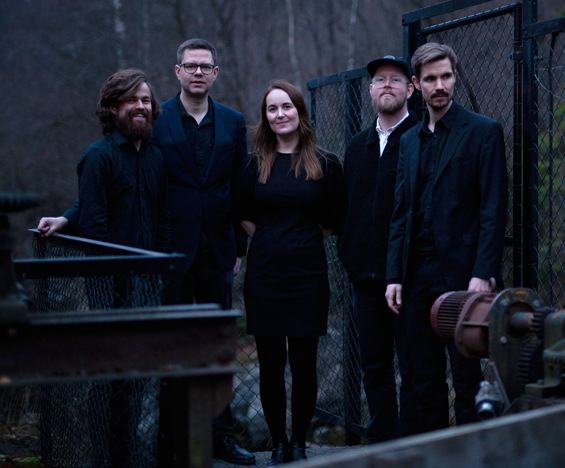
photo: Kristian Millstein (i-r: Jakob Eri Myhre, IIngi Bjarni Skúlason, Merje Kägu, Daniel Andersson, Tore Ljøkelsøy)
4. Like many a musical artist during the pandemic, you recorded an album featuring you playing alone, the result in your case 2021's Lessons. In comments you posted about your first solo piano album, you wrote that you “found it more difficult to record and produce than my trio and quintet albums.” This struck me as interesting because another artist might state the exact opposite, that recording alone is easier when it's less complicated than doing so with other musicians. What specifically was it about the recording process for Lessons that made it more difficult than the albums you're done with others?
IBS: The music on Lessons is perhaps more personal than that on my other albums. The pieces were a way for me to cope with some relationship turmoil I experienced in 2020; they were lessons for me, hence the album's name. What I found particularly challenging was being alone throughout the recording process. I recorded the album in a church, completely alone with a grand piano. The sound engineer helped set things up, but after that, I was by myself. For the first time, I realized the benefits of having a producer. An extra set of ears would have been nice. Also, when recording in a band setting, members provide feedback and suggest breaks, but I kept recording multiple takes without much rest.
Furthermore, Lessons was produced in a very short time, which was also a difficult process. So I learned a lot from the process of recording and releasing this album. I also released sheet music with the music on the album, available on my Bandcamp. In short, recording and producing this album was a challenging and exposing experience, but it was also an exercise in growth for me.
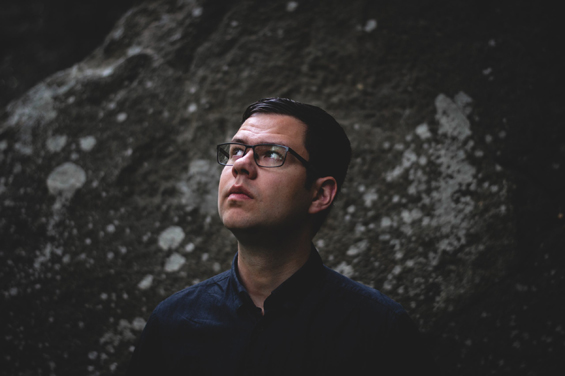
photo: Henrik Buller
5. Unless I'm mistaken, all of the compositions on your six albums are originals. That's a bit unusual as many a piano trio leader includes a small number of covers on an album to go along with the self-penned pieces, said covers often reflecting the pianist's influences. If, then, we were to imagine your next album as a collection of cover versions, what would its set-list look like, and what would be the reasons for your choices?
IBS: Yes, correct. I am a very active composer. There have been times when I composed or at least generated an idea every day. I have many unreleased pieces in different stages of development. As a result of this substantial output of compositions, it is almost unthinkable for me to make an album with covers. I need to get my music out there so that I can continue to compose, which I really enjoy. But of course, I have played a lot of music by others and learned from that. So if I were to release an album with covers, I could imagine recording these pieces:
“Solar”: This often-played standard is a great springboard for creativity. The chord changes are very nice to improvise over.
“Visa från Utanmyra”: This Swedish folk song has definitely influenced me over the years. "Visan" from Fragile Magic is indirectly inspired by this song.
“Interplay”: Being a Bill Evans fan, I would want to record one of his tunes. This melody has a sneaky mood that I like.
“Over”: A song by the Icelandic techno/electro band GusGus from their album Arabian Horse, an all-time favourite of mine.
"Geislar hennar”: Skúli Sverrisson is an electric bass player who has played with many great musicians. His albums Sería and Sería II are absolutely beautiful. This tune is from Sería.
“So Tender”: Keith Jarrett is undeniably a big hero in my life. I have only recently started practicing this composition of his. The tune features a complex harmony, but it's very nice to improvise over.
“Isfahan”: I think this jazz standard is a masterpiece, such a great melody. I would play it as a ballad.
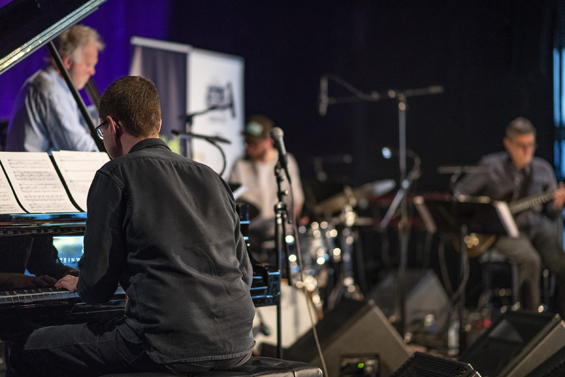
photo: Hans Vera
(Bonus question) While your trio albums fit comfortably within the piano trio tradition, surprises of one kind or another surface during the albums, too. On Skarkali, for example, the groove powering “Holland Spoor” is as much drum'n'bass as jazz, and Fragile Magic includes a track, “Introduction,” whose furious pulse leans towards rock. In other pieces, allusions to folk and even electronica also emerge. Are such deviations consciously incorporated or do they naturally arise over the course of the developmental stages a piece goes through before it's recorded?
IBS: Deviations in my music often arise naturally during the development of a piece, though they can sometimes be consciously incorporated. I don't specifically recall how the drum grooves in "Hollands Spoor" and "Introduction" came about; I believe the drummers simply played what the music called for.
I am subconsciously influenced by various kinds of music. It might surprise many, but as a teenager I exclusively listened to techno and trance music. Although I don't listen much to those genres today, they remain an integral part of me. I have also always been a fan of reggae. When I teach piano, I sometimes tell my students, “You have to listen to reggae to play jazz.” While this is partly just a fun thing to say, there is truth to it. Reggae offers valuable lessons in rhythmic nuances. I believe there is beauty in all music, regardless of the genre. I enjoy surprises and challenging the boundaries of genres whenever possible.
Website: INGI BJARNI SKÚLASON
August 2024![]()